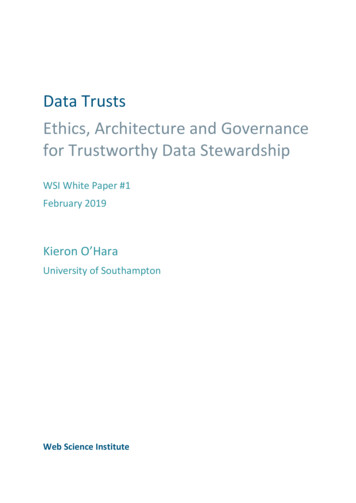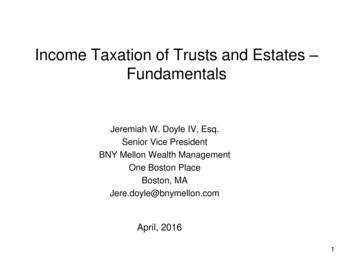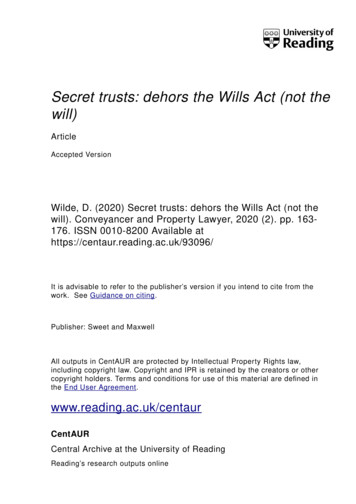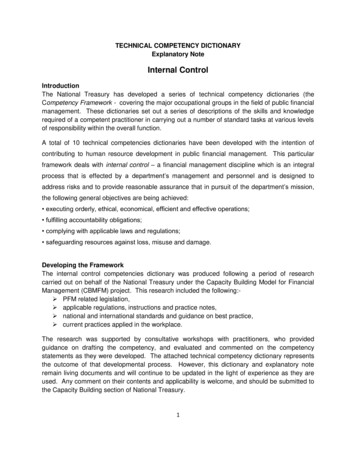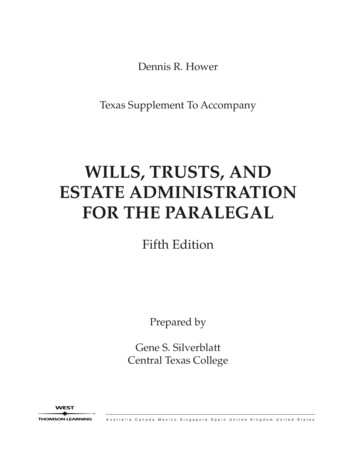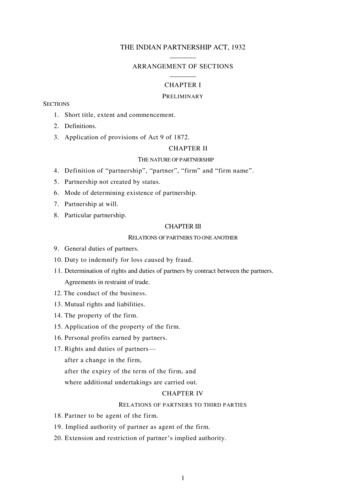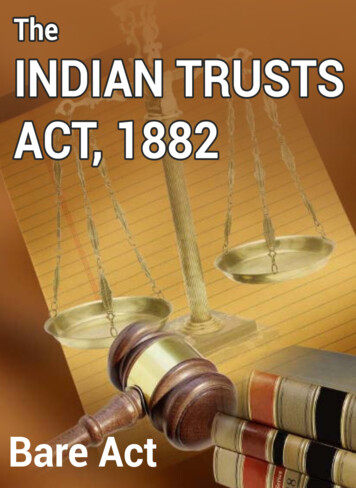
Transcription
THE INDIAN TRUSTS ACT, 18821* ACT No. 2 OF 1882[13th January, 1882.]An Act to define and amend the law relating to Private Trusts andTrustees.Preamble.-WHEREAS it is expedient to define and amend the lawrelating to Preamble. private trusts and trustees; It is herebyenacted as follows:CHAPTER IPRELIMINARY1. Short title. Commencement.-This Act may be called the IndianTrusts Act, 1882: and it shall come into force on the first day ofMarch, 1882.Local extent, Savings.-2*[It extends to 3*[the whole of India4*[except the State of Jammu and Kashmir] and] the Andaman and NicobarIslands 5***; but the Central Government may, from time to time, bynotification in the Official Gazette, extend it to 6*[the Andaman andNicobar Islands] or to any part thereof.] But nothing herein containedaffects the rules of Muhammadan law as to waqf, or the mutualrelations of the members of an undivided family as determined by anycustomary or personal law, or applies to public or private religiousor charitable endowments, or to trusts to distribute prizes taken inwar among the captors; and nothing in the Second Chapter of this Actapplies to trusts created before the said day.2. Repeal of enactments.-The Statute and Acts mentioned in theSchedule hereto annexed shall, to the extent mentioned in the saidSchedule, be repealed, in the territories to which this Act for thetime being extends.3. Interpretation-clause "trust":-A "trust" is an obligationannexed to the ownership of property, and arising out of a confidencereposed in and accepted by --------------------1 The Act has been extended to Berar by the Berar Laws Act, 1941 (4of 1941). Extended to and brought into force in Dadra and Nagar Havoli (w.e.f.1.7.1965) by Reg. 6 of 1963, s.2 and Sch.I Extended to Goa, Daman and Diu by Re. 11 of1963, s. 3 and Sch. The Act comes into force in Pondicherry on 1.10.1963 vide Reg. 7 of1963, s. 3 and Sch. I. The Act shall come into force in the State of Sikkim on 1.9.1984 videNotifn. No.S.O.642(E), dt.24.8.1984 Gaz. of India, Exty, pt. II Sec.3(ii).2 Subs. by the A. O. 1948 for the original words as amended by theA. O. 1937.3 Subs. by the A. O. 1950 for "all the Provinces of India, except".Collected by the All India Christian Council, www.christiancouncil.inPage 1 of 32
4 Subs. by Act 3 of 1951, s.3 and Sch., for "except Part B States".5 The words "and Panth Piploda" omitted by the A. O. 1950.6 Subs. by the A. O. 1950 for "either or both of the --------------------------------owner, or declared and accepted by him, for the benefit of another, orof another and the owner:"author of the trust":the person who reposes or declares the confidence is called the"author of the trust": the person who accepts the confidence is calledthe "trustee": the person for whose benefit the confidence is acceptedis called the "beneficiary": the subject-matter of the trust is called"trust-property" or "trust-money": the "beneficial interest" or"interest" of the beneficiary is his right against the trustee asowner of the trust-property; and the instrument, if any, by which thetrust is declared is called the "instrument of trust":"trustee": "beneficiary": "trust-property": "beneficial interest":"instrument of trust": "breach of trust":a breach of any duty imposed on a trustee, as such, by any lawfor the time being in force, is called a "breach of trust":"registered":"notice":Expressions defined in Act 9 of 1872.-and in this Act, unlessthere be something repugnant in the subject or context, "registered"means registered under the law for the registration of documents forthe time being in force: a person is said to have "notice" of a facteither when he actually knows that fact, or when, but for wilfulabstention from inquiry or gross negligence, he would have known it,or when information of the fact is given to or obtained by his agent,under the circumstances mentioned in the Indian Contract Act, 1872 (9of 1872), section 229; and all expressions used herein and defined inthe Indian Contract Act, 1872, shall be deemed to have the meaningsrespectively attributed to them by that Act.CHAPTER IIOF THE CREATION OF TRUSTS4. Lawful purpose.-A trust may be created for any lawful purpose.The purpose of a trust is lawful unless it is (a) forbidden by law, or(b) is of such a nature that, if permitted, it would defeat theprovisions of any law, or (c) is fraudulent, or (d) involves orimplies injury to the person or property of another, or (e) the CourtCollected by the All India Christian Council, www.christiancouncil.inPage 2 of 32
regards it as immoral or opposed to public policy.Every trust of which the purpose is unlawful is void. And where atrust is created for two purposes, of which one is lawful and theother unlawful, and the two purposes cannot be separated, the wholetrust is void.Explanation.--In this section the expression "law" includes,where the trust-property is immoveable and situate in a foreigncountry, the law of such country.Illustrations(a) A conveys property to B in trust to apply the profits to thenurture of female foundlings to be trained up as prostitutes. Thetrust is void.(b) A bequeaths property to B in trust to employ it in carryingon a smuggling business, and out of the profits thereof to support A'schildren. The trust is void.(c) A, while in insolvent circumstances, transfers property to Bin trust for A during his life, and after his death for B. A isdeclared an insolvent. The trust for A is invalid as against hiscreditors.5. Trust of immoveable property.-No trust in relation toimmoveable property is valid unless declared by a non-testamentaryinstrument in writing signed by the author of the trust or the trusteeand registered, or by the will of the author of the trust or of thetrustee.Trust of moveable property.-No trust in relation to moveableproperty is valid unless declared as aforesaid, or unless theownership of the property is transferred to the trustee.These rules do not apply where they would operate so as toeffectuate a fraud.6. Creation of trust.-Subject to the provisions of section 5, atrust is created when the author of the trust indicates withreasonable certainty by any words or acts (a) an intention on his partto create thereby a trust, (b) the purpose of the trust, (c) thebeneficiary, and (d) the trust-property, and (unless the trust isdeclared by will or the author of the trust is himself to be thetrustee) transfers the trust-property to the trustee.Illustrations(a) A bequeaths certain property to B, "having the fullestconfidence that he will dispose of it for the benefit of" C. Thiscreates a trust so far as regards A and C.(b) A bequeaths certain property to B "hoping he will continue itin the family". This does not create a trust, as the beneficiary isnot indicated with reasonable certainty.(c) A bequeaths certain property to B, requesting him todistribute it among such members of C's family as B should think mostdeserving. This does not create a trust, for the beneficiaries are notCollected by the All India Christian Council, www.christiancouncil.inPage 3 of 32
indicated with reasonable certainty.(d) A bequeaths certain property to B, desiring him to divide thebulk of it among C's children. This does not create a trust, for thetrust-property is not indicated with sufficient certainty.(e) A bequeaths a shop and stock-in-trade to B, on condition thathe pays A's debts and legacy to C. This is a condition, not a trustfor A's creditors and C.7. Who may create trusts.-A trust may be created-(a) by every person competent to contract, 1* and,(b) with the permission of a principal Civil Court oforiginal jurisdiction, by or on behalf of a minor;but subject in each case to the law for the time being in forceas to the circumstances and extent in and to which the author of thetrust may dispose of the trust-property.8. Subject of trust.-The subject-matter of a trust must beproperty transferable to the beneficiary.It must not be merely beneficial interest under a subsistingtrust.9. Who may be beneficiary. Disclaimer by beneficiary.-Everyperson capable of holding property may be a beneficiary.A proposed beneficiary may renounce his interest under the trustby disclaimer addressed to the trustee, or by setting up, with noticeof the trust, a claim inconsistent therewith.10. Who may be trustee.-Every person capable of holding propertymay be a trustee; but, where the trust involves the exercise ofdiscretion, he cannot execute it unless he is competent to contract.No one bound to accept trust.marginal heading. No one is bound to accept a trust.Acceptance of trust.marginal heading. A trust is accepted by any words or actsof the trustee indicating with reasonable certainty such acceptance.Disclaimer of trust.marginal heading. Instead of accepting a trust, the intendedtrustee may, within areasonable period, disclaim it, and such disclaimer shall prevent thetrust-property from vesting in him.A disclaimer by one of two or more co-trustees vests the trustproperty in the other or others, and makes him or them sole trustee ortrustees from the date of the creation of the trust.Illustrations(a) A bequeaths certain property to B and C, his executors, asCollected by the All India Christian Council, www.christiancouncil.inPage 4 of 32
trustees for D. B and C prove A's will. This is in itself anacceptance of the trust, and B and C hold the property in trust for D.(b) A transfers certain property to B in trust to sell it and topay out of the proceeds A's debts. B accepts the trust and sells theproperty. So far as regards B, a trust of the proceeds is created forA's -----------------------------1 See s. 11 of the Indian Contract Act, 1872 (9 of -------------------------(c) A bequeaths a lakh of rupees to B upon certain trusts andappoints him his executor. B severs the lakh from the general assetsand appropriates it to the specific purpose. This is an acceptance ofthe trust.CHAPTER IIIOF THE DUTIES AND LIABILITIES OF TRUSTEES11. Trustee to execute trust.-The trustee is bound to fulfil thepurpose of the trust, and to obey the directions of the author of thetrust given at the time of its creation, except as modified by theconsent of all the beneficiaries being competent to contract.Where the beneficiary is incompetent to contract, his consentmay, for the purposes of this section, be given by a principal CivilCourt of original jurisdiction.Nothing in this section shall be deemed to require a trustee toobey any direction when to do so would be impracticable, illegal ormanifestly injurious to the beneficiaries.Explanation.--Unless a contrary intention be expressed, thepurpose of a trust for the payment of debts shall be deemed to be (a)to pay only the debts of the author of the trust existing andrecoverable at the date of the instrument of trust, or, when suchinstrument is a will, at the date of his death, and (b) in the case ofdebts not bearing interest, to make such payment without interest.Illustrations(a) A, a trustee, is simply authorized to sell certain land bypublic auction. He cannot sell the land by private contract.(b) A, a trustee of certain land for X, Y and Z, is authorized tosell the land to B for a specified sum. X, Y and Z, being competent tocontract, consent that A may sell the land to C for a less sum. A maysell the land accordingly.(c) A, a trustee for B and her children, is directed by theauthor of the trust to lend, on B's request, trust-property to B'shusband, C, on the security of his bond. C becomes insolvent and Brequests A to make the loan. A may refuse to make it.12. Trustee to inform himself of state of trust-property.-Atrustee is bound to acquaint himself, as soon as possible, with theCollected by the All India Christian Council, www.christiancouncil.inPage 5 of 32
nature and circumstances of the trust-property; to obtain, wherenecessary, a transfer of the trust-property to himself; and (subjectto the provisions of the instrument of trust) to get in trust-moneysinvested on insufficient or hazardous security.Illustrations(a) The trust-property is a debt outstanding on personalsecurity. The instrument of trust gives the trustee no discretionarypower to leave the debt so outstanding. The trustee's duty is to recover the debt withoutunnecessary delay.(b) The trust-property is money in the hands of one of two cotrustees. No discretionary power is given by the instrument of trust.The other co-trustee must not allow the former to retain the money fora longer period than the circumstances of the case required.13. Trustee to protect title to trust-property.-A trustee isbound to maintain and defend all such suits, and (subject to theprovisions of the instrument of trust) to take such other steps as,regard being had to the nature and amount or value of the trustproperty, may be reasonably requisite for the preservation of thetrust-property and the assertion or protection of the title thereto.IllustrationThe trust-property is immoveable property which has been given tothe author of the trust by an unregistered instrument. Subject to theprovisions of the Indian Registration Act, 1877 (3 of 1877), 1* thetrustee's duty is to cause the instrument to be registered.14. Trustee not to set up title adverse to beneficiary.-Thetrustee must not for himself or another set up or aid any title to thetrust-property adverse to the interest of the beneficiary.15. Care required from trustee.-A trustee is bound to deal withthe trust-property as carefully as a man of ordinary prudence woulddeal with such property if it were his own; and, in the absence of acontract to the contrary, a trustee so dealing is not responsible forthe loss, destruction or deterioration of the trust-property.Illustrations(a) A, living in Calcutta, is a trustee for B, living in Bombay.A remits trust-funds to B by bills drawn by a person of undoubtedcredit in favour of the trustee as such, and payable at Bombay. Thebills are dishonoured. A is not bound to make good the loss.(b) A, a trustee of leasehold property, directs the tenant to paythe rents on account of the trust to a banker. B, then in credit. Therents are accordingly paid to B, and A leaves the money with B onlytill wanted. Before the money is drawn out, B becomes insolvent. A,having had no reason to believe that B was in insolvent circumstances,is not bound to make good the loss.(c) A, a trustee of two debts for B, releases one and compoundsCollected by the All India Christian Council, www.christiancouncil.inPage 6 of 32
the other, in good faith, and reasonably believing that it is for B'sinterest to do so. A is not bound to make good any loss caused therebyto B.(d) A, a trustee directed to sell the trust-property by auction,sells the same, but does not advertise the sale and otherwise fails inreasonable diligence in inviting competition. A is bound to make goodthe loss caused thereby to the ------------------------------1 See now the Indian Registration Act, 1908 (16 of ------------------------(e) A, a trustee for B, in execution of his trust, sells thetrust-property, but from want of due diligence on his part fails toreceive part of the purchase-money. A is bound to make good the lossthereby caused to B.(f) A, a trustee for B of a policy of insurance, has funds inhand for payment of the premiums. A neglects to pay the premiums, andthe policy is consequently forfeited. A is bound to make good the lossto B.(g) A bequeaths certain moneys to B and C as trustees, andauthorizes them to continue trust-moneys upon the personal security ofa certain firm in which A had himself invested them. A dies, and achange takes place in the firm. B and C must not permit the moneys toremain upon the personal security of the new firm.(h) A, a trustee for B, allows the trust to be executed solely byhis cotrustee, C. C misapplies the trust-property. A is personallyanswerable for the loss resulting to B.16. Conversion of perishable property.-Where the trust is createdfor the benefit of several persons in succession, and the trustproperty is of a wasting nature or a future or reversionary interest,the trustee is bound, unless an intention to the contrary may beinferred from the instrument of trust, to convert the propertyof a in to property permanent and immediately profitable character.Illustrations(a) A bequeaths to B all his property in trust for C during hislife, and on his death for D, and on D's death for E. A's propertyconsists of three leasehold houses, and there is nothing in A's willto show that he intended the houses to be enjoyed in specie. B shouldsell the houses, and invest the proceeds in accordance with section20.(b) A bequeaths to B his three leasehold houses in Calcutta andall the furniture therein in trust for C during his life, and on hisdeath for D, and on D's death for E. Here an intention that the housesand furniture should be enjoyed in specie appears clearly, and Bshould not sell them.17. Trustee to be impartial.-Where there are more beneficiariesCollected by the All India Christian Council, www.christiancouncil.inPage 7 of 32
than one, the trustee is bound to be impartial, and must not executethe trust for the advantage of one at the expense of another.Where the trustee has a discretionary power, nothing in thissection shall be deemed to authorize the Court to control the exercisereasonably and in good faith of such discretion.IllustrationA, a trustee for B, C and D, is empowered to choose betweenseveral specified modes of investing the trust-property. A in goodfaith chooses one of these modes. The Court will not interfere,although the result of the choice may be to vary the relative rightsof B, C and D.18. Trustee to prevent waste.-Where the trust is created for thebenefit of several persons in succession and one of them is inpossession of the trust-property, if he commits, or threatens to commit, any act which isdestructive or permanently injurious thereto, the trustee is bound to take measuresto prevent such act.19. Accounts and information.-A trustee is bound (a) to keepclear and accurate accounts of the trust-property, and (b), at allreasonable times, at the request of the beneficiary, to furnish himwith full and accurate information as to the amount and state of thetrust-property.20. Investment of trust-money.-Where the trust-property consistsof money and cannot be applied immediately or at an early date to thepurposes of the trust, the trustee is bound (subject to any directioncontained in the instrument of trust) to invest the money on thefollowing securities, and on no others:(a) in promissory notes, debentures, stock or othersecurities 1*[of any State Government or] of theCentral Government or of the United Kingdom of GreatBritain and Ireland:2*[Provided that securities, both the principal whereof andthe interest whereon shall have been fully andunconditionally guaranteed by any such Government shallbe deemed, for the purposes of this clause, to besecurities of such Government;](b) in bonds, debentures and annuities 3*[charged or securedby the 4*[Parliament of the United Kingdom] 5* [beforethe fifteenth day of August, 1947] on the revenues ofIndia or of the 6*[Governor-General in Council] or ofany Province]:7*[Provided that, after the fifteenth day of February, 1916,no money shall be invested in any such annuity being aterminable annuity unless a sinking fund has beenestablished in connection with such annuity; butnothing in this proviso shall apply to investments madebefore the date aforesaid;]Collected by the All India Christian Council, www.christiancouncil.inPage 8 of 32
------------------1 Ins. by Act 31 of 1920, s. 2 and Sch. I.2 Added by Act 18 of 1934, s. 2.3 Subs. by the A. O. 1937 for "charged by the Imperial Parliamenton the revenues of India".4 Subs. by the A. O. 1950 for "Imperial Parliament".5 Ins. by the A. O. 1948.6 Subs. by the A. O. 1948 for "Federation".7 Added by Act 1 of 1916, s. --------------------1*[(bb) in India three and a half per cent. stock, Indiathree per cent. stock, India two and a half per cent.stock or any other capital stock 2*[which before the15th day of August, 1947, was] issued by the Secretaryof State for India in Council under the authority of anAct of Parliament 3*[of the United Kingdom] and chargedon the revenues of India] 4*[or which 5*[was] issued bythe Secretary of State on behalf of the GovernorGeneral in Council under the provisions of Part XIII ofthe Government of India Act, 1935]; (26 Geo. 5, Ch. 2.)(c) in stock or debentures of, or shares in, Railway orother Companies the interest whereon shall have beenguaranteed by the Secretary of State for India inCouncil 1*[or by the Central Government] 6*[or indebentures of the Bombay 7*[Provincial] Co-operativeBank, Limited, the interest whereon shall have beenguaranteed, by the Secretary of State for India inCouncil] 4*[or the State Government of Bombay];8*[(d) in debentures or other securities for money issued,under the authority of 9*[any Central Act or ProvincialAct or State Act], by or on behalf of any municipalbody, port trust or city improvement trust in anyPresidency-town, or in Rangoon Town, or by or on behalfof the trustees of the port of Karachi:]10*[Provided that after the 31st day of March, 1948, nomoney shall be invested in any securities issued by oron behalf of a municipal body, port trust or cityimprovement trust in Rangoon town, or by or on behalfof the trustees of the port of ---------------------------1 Ins. by Act 1 of 1916, s. 2.2 Subs. by the A. O. 1950 for "which may at any time hereafter be".3 Ins. by the A. O. 1950.4 Ins. by the A. O. 1937.5 Subs. by the A. O. 1950 for "may be".6 Ins. by Act 21 of 1917, s. 2.7 Subs. by Act 37 of 1925, s. 2 and Sch. I, for "Central".Collected by the All India Christian Council, www.christiancouncil.inPage 9 of 32
8 Subs. by Act 3 of 1908, s. 2, for the original clause.9 The words "any Act of a Legislature established in British India"have been successively amended by the A. O. 1948, the A. O. 1950 andAct 3 of 1951 to read as above.10 Ins. by the A. O. -----------------------(e) on a first mortgage of immoveable property situate in1*[any part of the territories to which this Actextends]: Provided that the property is not a leaseholdfor a term of years and that the value of the propertyexceeds by one-third, or, if consisting of buildings,exceeds by one-half, the mortgage-money;4***4*(ee) in units issued by the Unit Trust of India under anyunit scheme made under section 21 of the Unit Trustof India Act, 1963; or;(f) on any other security expressly authorized by theinstrument of trust 4* [or by the Central Government bynotification in the Official Gazette,] or by any rulewhich the High Court may from time to time prescribe inthis behalf:Provided that, where there is a person competent to contract andentitled in possession to receive the income of the trust-property forhis life, or for any greater estate, no investment on any securitymentioned or referred to in clauses (d), (e) and (f) shall be madewithout his consent in writing.2*[20A. Power to purchase redeemable stock at a premium.-(1) Atrustee may invest in any of the securities mentioned or referred toin section 20, notwithstanding that the same may be redeemable andthat the price exceeds the redemption value:Provided that a trustee may not purchase at a price exceeding itsredemption value any security mentioned or referred to in clauses (c)and (d) of section 20 which is liable to be redeemed within fifteenyears of the date of purchase at par or at some other fixed rate, orpurchase any such security as is mentioned or referred to in the saidclauses which is liable to be redeemed at par or at some other fixedrate at a price exceeding fifteen per centum above par or such otherfixed rate.(2) A trustee may retain until redemption any redeemable stock,fund or security which may have been purchased in accordance with thissection.]21. Mortgage of land pledged to Government under Act 26 of 1871.Deposit in Government Savings Bank. Nothing in section 20 shall applyto investments made before this Act comes into force, or shall bedeemed to preclude an investment on a mortgage of immoveable propertyalready pledged as security for an advance under the Land ImprovementAct, 18713*, or, in case the trust-money does not exceed threethousand rupees, a deposit thereof in a Government Savings Bank.Collected by the All India Christian Council, www.christiancouncil.inPage 10 of 32
------------------1 Subs. by Act 3 of 1951, s. 3 and Sch., for "a Part A State or aPart C State".2 Ins. by Act 1 of 1916, s. 3.3 See now the Land Improvement Loans Act, 1883 (19 of 1883).4 Omitted and ins by Act 16 of 1975, s. 2 (w.e.f. ----------------------------22. Sale by trustee directed to sell within specified time.-Wherea trustee directed to sell within a specified time extends such time,the burden of proving, as between himself and the beneficiary, thatthe latter is not prejudiced by the extension lies upon the trustee,unless the extension has been authorized by a principal Civil Court oforiginal jurisdiction.IllustrationA bequeaths property to B, directing him with all convenientspeed and within five years to sell it, and apply the proceeds for thebenefit of C. In the exercise of reasonable discretion, B postponesthe sale for six years. The sale is not thereby rendered invalid, butC, alleging that he has been injured by the postponement, institutes asuit against B to obtain compensation. In such suit the burden ofproving that C has not been injured lies on B.23. Liability for breach of trust.-Where the trustee commits abreach of trust, he is liable to make good the loss which the trustproperty or the beneficiary has thereby sustained, unless thebeneficiary has by fraud induced the trustee to commit the breach, orthe beneficiary, being competent to contract, has himself, withoutcoercion or undue influence having been brought to bear on him,concurred in the breach, or subsequently acquiesced therein, with fullknowledge of the facts of the case and of his rights as against thetrustee.A trustee committing a breach of trust is not liable to payinterest except in the following cases:(a) where he has actually received interest:(b) where the breach consists in unreasonable delay inpaying trust-money to the beneficiary:(c) where the trustee ought to have received interest, buthas not done so:(d) where he may be fairly presumed to have receivedinterest.He is liable, in case (a), to account for the interest actuallyreceived, and, in cases (b), (c) and (d), to account for simpleinterest at the rate of six per cent. per annum, unless the Courtotherwise directs.(e) where the breach consists in failure to invest trustmoney and to accumulate the interest or dividendsthereon, he is liable to account for compound interestCollected by the All India Christian Council, www.christiancouncil.inPage 11 of 32
(with halfyearly rests) at the same rate:(f) where the breach consists in the employment oftrustproperty or the proceeds thereof in trade orbusiness, he is liable to account, at the option of the beneficiary,either for compound interest (with half-yearly rests)at the same rate, or for the net profits made by suchemployment.Illustrations(a) A trustee improperly leaves trust-property outstanding, andit is consequently lost: he is liable to make good the property lost,but he is not liable to pay interest thereon.(b) A bequeaths a house to B in trust to sell it and pay theproceeds to C. B neglects to sell the house for a great length oftime, whereby the house is deteriorated and its market price falls. Bis answerable to C for the loss.(c) A trustee is guilty of unreasonable delay in investing trustmoney in accordance with section 20, or in paying it to thebeneficiary. The trustee is liable to pay interest thereon for theperiod of the delay.(d) The duty of the trustee is to invest trust-money in any ofthe securities mentioned in section 20, clause (a), (b), (c) or (d).Instead of so doing, he retains the money in his hands. He is liable,at the option of the beneficiary, to be charged either with the amountof the principal money and interest, or with the amount of suchsecurities as he might have purchased with the trust-money when theinvestment should have been made, and the intermediate dividends andinterest thereon.(e) The instrument of trust directs the trustee to invest trustmoney either in any of such securities or on mortgage of immoveableproperty. The trustee does neither. He is liable for the principalmoney and interest.(f) The instrument of trust directs the trustee to invest trustmoney in any of such securities and to accumulate the dividendsthereon. The trustee disregards the direction. He is liable, at theoption of the beneficiary, to be charged either with the amount of theprincipal money and compound interest, or with the amount of suchsecurities as he might have purchased with the trust-money when theinvestment should have been made, together with the amount of theaccumulation which would have arisen from a proper investment of theintermediate dividends.(g) Trust-property is invested in one of the securities mentionedin section 20, clause (a), (b), (c) or (d). The trustee sells suchsecurity for some purpose not authorized by the terms of theinstrument of trust. He is liable, at the option of the beneficiary,either to replace the security with the intermediate dividends
1 The Act has been extended to Berar by the Berar Laws Act, 1941 (4 of 1941). Extended to and brought into force in Dadra and Nagar Havoli (w.e.f. 1.7.1965) by Reg. 6 of 1963, s.2 and Sch.I Extended to Goa, Daman and Diu by Re. 11 of 1963, s. 3 and Sch. The Act comes into force in Pondicherry on 1.10.1963 vide Reg. 7 of 1963, s. 3 and Sch. I.



